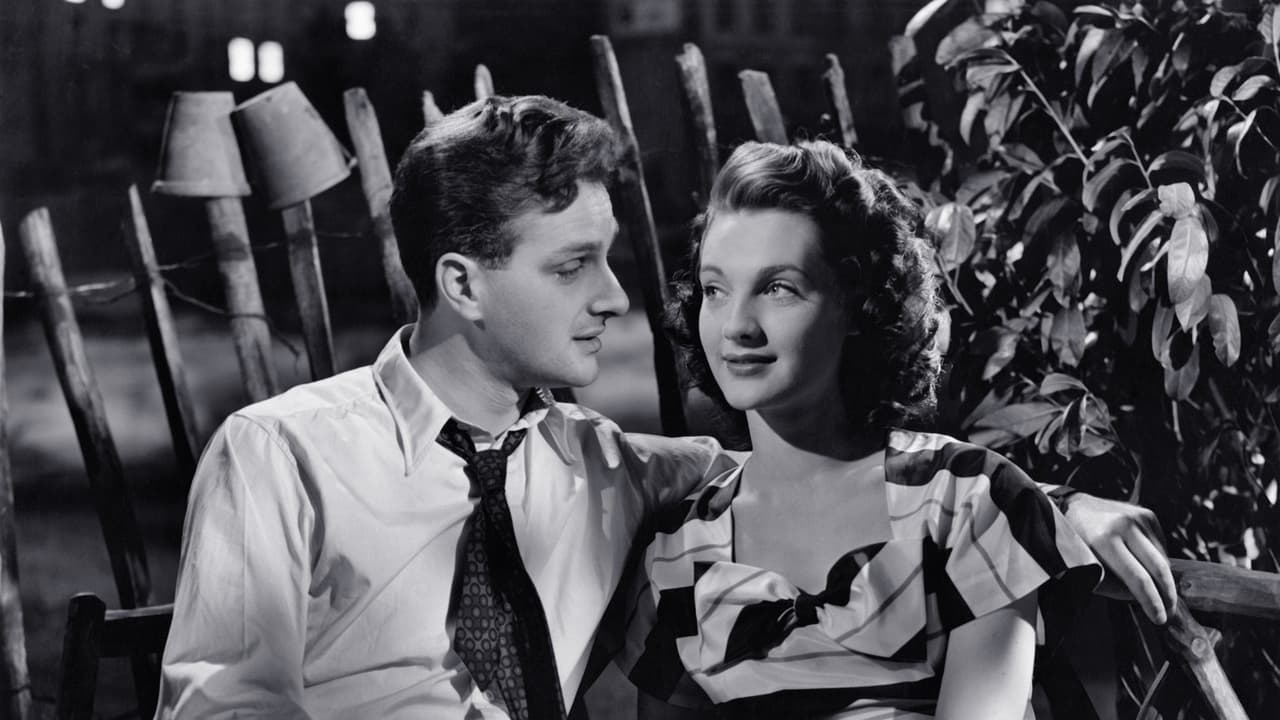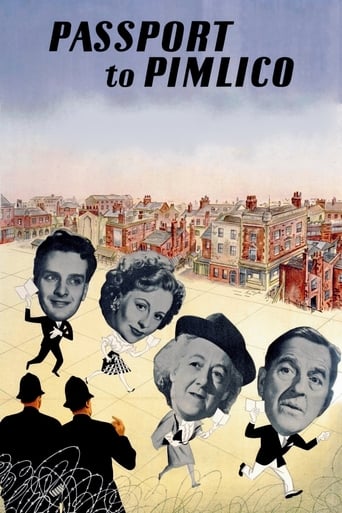

An accidental explosion in the London district of Pimlico leads to the discovery that almost 600 years ago, it belonged to the state of Burgundy, and evidence of this convinces the locales to cede from the mother country and create their own. This creates chaos amongst the law and order of the region, and before you know it, passports are required to go from other parts of London through Pimlico which now has its own customs agent before even crossing the channel over to the mainland. Later, barbed wire fences are installed and the water supply is cut off, but the London neighbors, aghast by this, begin showing the new country support in ways that Parliment didn't expect.This is a grand political comedy with dark overtones that really makes one think of how much we both love and hate our own individual governments, loyal to the ideals on which they were created, but aghast by the abuses the people in power take on. The locales of Pimlico here go haywire as the news breaks, a huge party at the local pub breaks out (with the constable on duty joining in!), and with the recent world war still having an effect on society, and rationing the law of England, the townsfolk break out their goods for sale and begin peddling them on the street as they had before the war. An all-star cast of some of England's greatest actors all deliver excellent performances, with Hermoine Baddley as a local dress shop keeper, Margaret Rutherford as a history expert, and Stanley Holloway as one of the local leaders standing out. Some of the references to British culture and trends may seem a bit foreign to American audiences, but it is a good way to learn a little bit of another culture and understand some of the slang terms (at least of the times) while having a good laugh at convention and the leadership of government which at some times still seems like schoolboys playing cops and robbers or cowboys and Indians. There's a very funny metaphor concerning the temperature which rises immediately upon ceding from England and the results of what happens when the plot is resolved.
... View More"Welcome to Pimlico, a suburb of London where an unexploded bomb from World War II accidentally explodes. The aftermath reveals buried treasure and ancient documents that prove the region to be part of the French province of Burgundy, and consequently foreign territory. An un-amused British Government tries to regain control by creating border checkpoints and cutting off essential services. However, they haven't reckoned with the resolve of the 'Burgundians' who are determined to fight for their newly found independence," according to the folks at synopsis central...Betty Warren (as Connie) explains, "We always were English and we'll always be English, and it's just because we are English that we're sticking up for our right to be Burgundians!" This is the kind of humor prevalent in T.E.B. Clarke's witty script. British manners or lack thereof are quite nicely captured, but a closer inspection reveals fun poked at imperialism and classed society in general. The story was supposedly based on an actual Canadian incident; the notion is also evident in United States "Reservations" declared for Native Americans and the partitioning of Berlin.******** Passport to Pimlico (4/26/49) Henry Cornelius ~ Stanley Holloway, Hermione Baddeley, Margaret Rutherford, Paul Dupuis
... View MoreAlthough sometimes it takes a bit of knowledge of foreign institutions to get some of the humor being imparted in a comedy like Passport To Pimlico in this case American audiences could have identified with it immediately. We had the same kind of price controls that were kept in place even after peace was declared in the USA and American moviegoers could have truly related to what the residents of Pimlico were going through.It's now peace in Europe as the United Kingdom as well as the rest of the continent start to rebuild after World War II. The residents of the London working class neighborhood of Pimlico one fine day have one of Mr. Hitler's unexploded calling cards go off on them. One of the leading citizens of Pimlico, green grocer Stanley Holloway goes down into the hole and comes up with treasure which the crown immediately claims. But he also uncovers a document which reveals that the last Duke of Burgundy did not die in 1477, but escaped and was granted asylum in England by Edward IV and given a royal charter for what is now the neighborhood of Pimlico. And along comes a Frenchman, Jean Dupuis who claims to be a descendant of the Duke and the current rightful Duke. He makes Holloway his prime minister.Getting a few city blocks declared foreign territory opens up some interesting possibilities, all exploited in Passport To Pimlico. It gets kind of wild there with London trams stopped for customs and immigration, when the black market can operate with impunity in these blocks, the local bank is nationalized by the new Burgundian government. It's all quite merry and done with style.Naturally this does come to an end though I will not say how. I have to also single out Margaret Rutherford as an eccentric history professor who is the one who translates the charter scroll and sets all this merriment in motion.The British public just as the American public was tired of the wartime rationing and price controls. Their movie-going public and our's both responded well to one of Ealing Studios best comedies of the era.
... View MoreSay what you like about the cinematic importance of the Ealing Studios comedies of the late 1940s and early 1950s, but nobody can deny that pretty much all of them have a lot of heart, and always provide 90 minutes of solid, quirky entertainment. My #7 film from the studio is 'Passport to Pimlico (1949),' directed by Henry Cornelius {in his directorial debut}, which tells the peculiar story of a small London district that unexpectedly becomes its own separate nation. After a bomb left over from WWII accidentally detonates underground, a local resident of Pimlico discovers a stash of treasure belonging to Charles VII "The Rash", the last Duke of Burgundy. Also discovered is an ancient document declaring that the small district, in actual fact, is the last existing slice of Burgundian land, effectively making it a country of its own. The small band of friendly residents are initially excited about this discovery, but have some misgivings when criminals and black-market dealers realise that the London police have absolutely no jurisdiction in the streets of Pimlico. While the British government entangles the issue in lengths of red-tape, the newly-realised nation of Burgundy tries desperately to sort itself out.The scenario behind 'Passport to Pimlico' really isn't as ludicrous as it initially sounds. The screenplay, written by T.E.B. Clarke {who also wrote 'The Lavender Hill Mob (1951)'}, was inspired by a real-life occurrence during World War Two, when the Canadian government decreed that a maternity ward belonged officially to the Netherlands, to accommodate the birth of Princess Juliana's child {under Dutch law, a royal heir had to be born in the Netherlands in order to be eligible for succession to the throne}. It also appears that some of the events in the film were based upon the Berlin Blockade (June 24, 1948 May 11, 1949), in which Western forces bypassed the Soviet blockades to sectors of Berlin via airlifts of food and other provisions. In this film, the British government's attempts to starve-out the troublesome Burgundians prove unsuccessful after crowds of sympathetic Londoners bombard the district with supplies, even air-dropping a fully-grown pig with a parachute.Though the story occasionally drags, 'Passport to Pimlico' proves worthwhile thanks to its unique storyline and a collection of entertaining characters. Police Constable Sid Spiller (Philip Stainton) is probably the film's funniest, particularly when he first realises the implications of Pimlico becoming its own nation ("Blimey, I'm a foreigner!") and when, working undercover to procure water for the reservoir, he must elude a drunk who simply insists on being arrested. Other notable players include Stanley Holloway, Betty Warren, Margaret Rutherford and Hermione Baddeley. Notably, Clarke's screenplay was nominated at the 1950 Oscars, and the film was nominated for Best British film at the 1950 BAFTA awards in the latter category, Cornelius' film lost to Carol Reed's masterpiece 'The Third Man (1949),' but it was in good company. Also nominated were the other Ealing classics, 'Kind Hearts and Coronets,' 'Whisky Galore!' and {a favourite of mine} 'A Run For Your Money.'
... View More